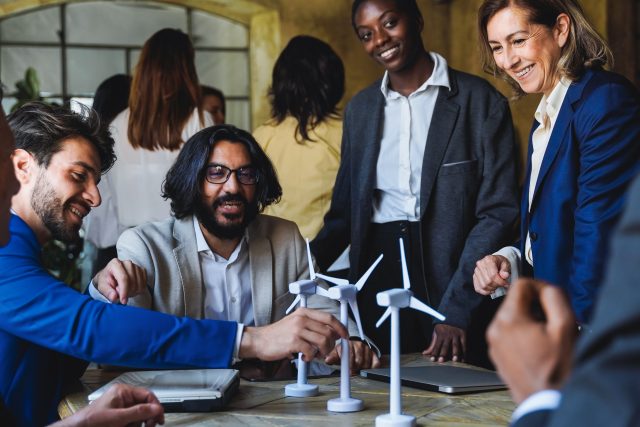Africa has always been able to host large-scale energy events, and African Energy Week has proven that. Despite the challenges posed by the COVID-19 pandemic, African Energy Week (AEW) has shown that the continent is still capable of hosting large-scale energy events. In 2021, Africa Oil Week (AOW) decided to host its conference in Dubai, arguing that Africa was not equipped to host a large-scale conference safely due to the Civid-19 pandemic. The decision to hold the conference outside Africa, although it is a platform focused on African energy, has led to discussions on the fact that Africa is no longer a container and is led by international actors. The AOW claims that the event is focused on the needs of Africa but the decision to leave Cape Town for Dubai contradicts this same ambition.
Then, in 2022, the AOW made the decision to return to Africa, affirming its commitment to boost investment in African energy. Yet, at a time when Africa needed investment the most, the conference organizer rushed to Dubai.
What the African Energy Week (AEW) has tried to prove, and succeeded in doing, is that Africa has always been able to host large-scale events. As part of strict security measures (COVID-19), the event proudly hosted delegations from the African and global energy sectors, and billions of euros of investments were secured from the first edition of the conference. In 2022, the conference attracted thousands of delegates, and a series of sectoral agreements were signed by companies and investors. At a time when Africa needed investment the most, the AEW responded quickly by providing a platform where stakeholders could meet and agreements could be reached.
Today, in 2023, the conference promises an even bigger and better event than before, with expanded roundtables, networking functions and engagement opportunities laying the foundation for widespread and sustainable growth in Africa.
The theme of this year’s AEW is the “African Energy Renaissance”, “Prioritizing Energy Poverty, People, Planet, Industrialization and Free Markets”., and is the platform for decisions on Africa’s energy future. Since the event’s inception, AEW has been a platform where every segment of the African energy sector is explored, with a focus on how Africa can grow, capitalizing on natural resources while mitigating climate change in the era of energy transition.
This discussion could not have been more timely for the continent. In 2023, South Africa is facing one of the worst energy crises it has ever experienced, with power cuts of up to ten hours a day. Despite large oil and gas reserves revealed by the discoveries of Brulpadda and Luiperd, the country continues to fight against irregular supplies and high energy prices. Meanwhile, its neighbour, Namibia, has made three major oil and gas discoveries since 2022 – Venus, Graff and Jonker-1X – and is making significant progress in developing these major discoveries.
Another neighbour, Mozambique, is making steady progress on its three major gas projects – Mozambique Liquefied Natural Gas (LNG), Rovuma LNG and Coral South – which are opening up new opportunities for regional trade, provided adequate infrastructure is in place. Thus, while the AOW continues to worry about its divisions and its international orientation, AEW has placed the energy crisis south-AEW understands what people are going through and the solutions that need to be put in place to solve South Africa’s energy crisis.
However, AEW’s goal goes beyond South Africa, the event recognizing and supporting the development of various oil and gas projects across the continent. In Senegal and Mauritania, the first production is expected for the Sangomar and Greater Ahmeyim Turtle projects, which shows the potential for investment in offshore E&P. In Congo-Brazzaville, marginal projects are progressing, with the government giving priority to investment and gas development, while Libya recently announced that production had reached 1.2 million barrels per day, which is a significant step forward.
In Uganda, progress continues to be made in the development of Lake Albert, a multi-faceted project that promises new opportunities for energy security and industrialization in East Africa. All these projects, and many more, will be presented to the AEW, and investment opportunities will be clearly explained to existing and potential investors.
This year, the focus will be even more on Africa’s energy security and sustainability, with discussions focused on how the continent can become industrialized, Electrify and prosper economically while decarbonizing through the development of a strong green energy base based on oil and gas revenues. From addressing regulatory and tax issues, to exploring green energy and low-carbon solutions, to advocating for the monetization of natural gas and regional infrastructure development, AEW 2023 is an opportunity to sign energy agreements and kick-start development projects.
While they can create advisory committees on low energy to show that they are focused on Africa, AEW will maintain its commitment to the continent by providing a comprehensive platform where energy actors can meet and where agreements can be signed. We are fully committed to stimulating investment across the energy value chain in Africa and will continue to ensure that energy poverty becomes history this year and beyond,” said NJ Ayuk. Executive Chairman of the African Chamber of Energy, adding: We urge the members of their committees to advise them not to misrepresent the ministers and speakers who will participate in the AOW. Our main objective is to attract investment to Africa. We believe that African countries have the right to develop their oil and gas projects. Projects such as the East African crude oil pipeline from Uganda are critical to making energy poverty a thing of the past and we want to partner with various governments to have the AEW discuss an oil and gas strategy for Africa. We are not stage builders: we are a movement. We look forward to welcoming the regional and African energy community to Cape Town from October 16-20 for the AEW.”















































